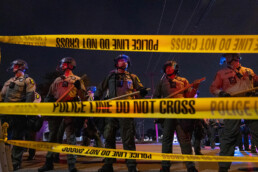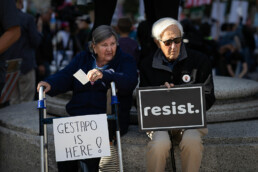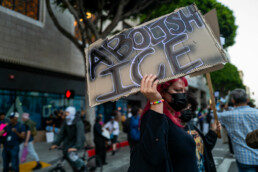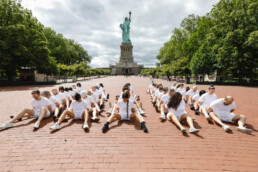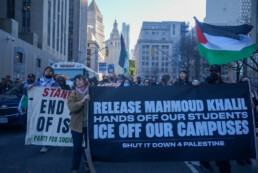"We're Being Robbed of Time"
Two women share what it was like to lose their husbands to "self-deportation."
By Anna Lekas Miller
Ordinarily, Julie is a night owl. She is used to staying up late while her husband, Neftali, whom she affectionately calls “Nef,” goes to bed early to wake up for his construction jobs.
Even these days, “I find myself tiptoeing around at night, trying to be quiet,” she says. “Then I realize he isn’t there.”
Neftali didn’t pass away—in October, he made the difficult decision to “self-deport” to Mexico, leaving Julie, a U.S. citizen and business owner, behind in Newark, New Jersey. And like a growing number of families in Trump’s America, they are now living separated by a border, wondering what they have to do to find their way back to each other.
Julie, now 47, and Neftali, 45, first met through friends in 2008 and started dating in 2011. Back then, she didn’t think it was a big deal that he didn’t have papers. But when Trump first came to office in January 2017, they started getting nervous. The two went to City Hall to tie the knot, just to be safe. “We didn’t want to take any chances,” she says.
But when they went to adjust Neftali’s status, they were slapped with a rude awakening. Even as a U.S. citizen, Julie couldn’t sponsor Neftali—long before they met, he had crossed the border twice, and because of a piece of Clinton-era legislation, this meant that he was ineligible for a green card. At the time, they decided to do what they always do—look over their shoulder and stay away from police. But as Trump’s second crackdown on undocumented immigrants began, and they started to hear more stories of people being detained and even disappearing, Julie and Neftali began to reconsider their lives in the United States.
When the couple finally decided it was time for Neftali to leave the U.S. last month, Julie traveled with him. “I spent five days with him in Mexico, and it was one of the most painful, but exhilarating experiences.” Julie says. The moment there was no longer a threat of Neftali being arrested, she adds, both of them felt immense relief.
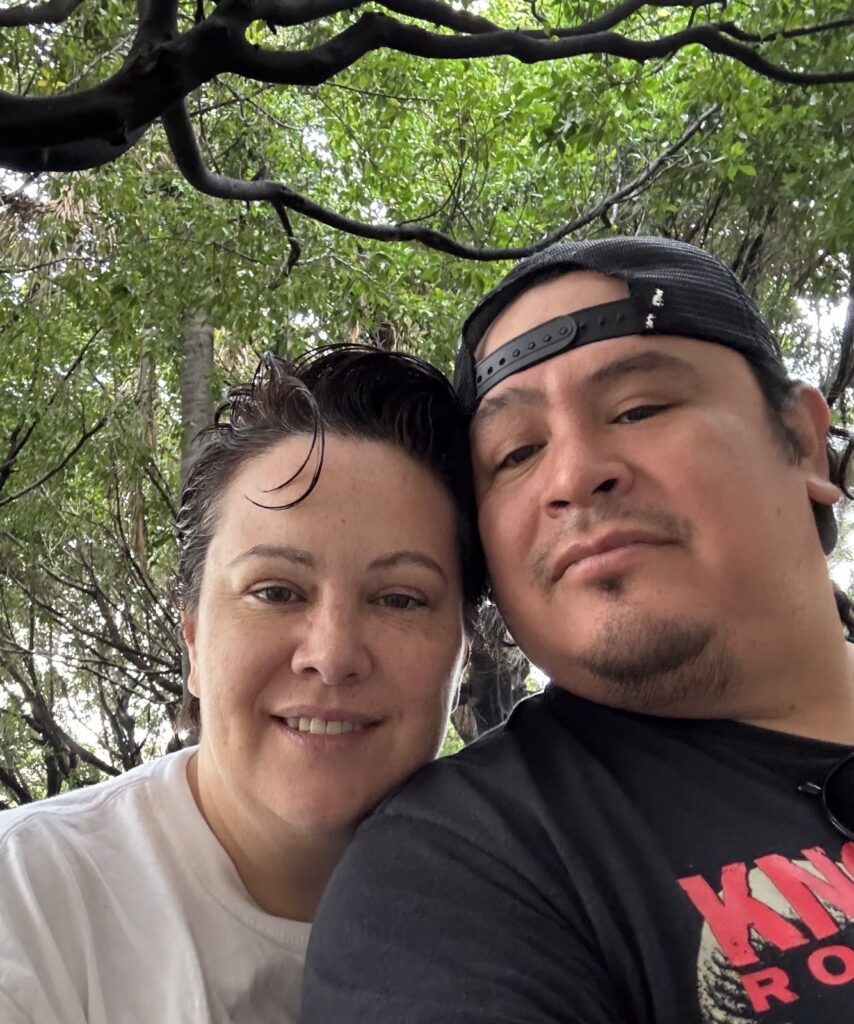
It is difficult to know precisely how many people have self-deported from the United States. The Department of Homeland Security claims that 1.6 million individuals have done so using the CBP Home app, but this number has been disputed.
Julie and Neftali represent one of 4.5 million “mixed-status” households across the country. Some of these households include a U.S. citizen married to someone without papers; others include children born in the United States to undocumented parents. All undocumented individuals are vulnerable now, but statistically, it is men who are more frequently targeted during ICE raids; when they are forcibly removed from their families, be it through arrest or self-deportation, their spouses and children are left behind to navigate a cruel system.
“We’re being robbed of time together,” Julie tells me. “When I’m having a bad day or a bad moment, I can’t feel him close like I do when he’s here.”
“We weren’t really living.”
Several states over, in North Carolina, Jenni Rivera, 54, and her husband, Fidel, 48, share a similar story. Jenni is a high school math teacher; Fidel, an electrician. They have two children together and met salsa dancing almost twenty years ago. “It was like the beginning of any relationship—we just couldn’t get enough of each other,” Jenni recalls.
Even though Fidel had been living in the U.S. without papers when they met, Jenni assumed that she could fix it through marriage. But when they went to an attorney, they learned that he would likely be barred from re-entering the country for 10 years if he tried to adjust his status. “At the time, we had an infant,” she tells me. “There was no way that I was going to separate my spouse from his daughter for 10 years.” So Jenni and Fidel accepted that they would continue to live in the shadows.

“We didn’t go anywhere [that] we couldn’t drive [to],” she remembers—boarding a plane and having IDs scrutinized by TSA agents felt too risky. That meant no more trips to Florida to see her family, and no vacations that weren’t within a short drive of their home in North Carolina. In the summer of 2024, Jenni took their daughters—both U.S. citizens by birth—on a road trip across the country, but without Fidel, it felt empty. “I knew he would love the prairie dogs,” she laughs, recalling a stop in South Dakota. “He would be making up stories about them, having ridiculous conversations with them, telling the girls stories from when he used to be a rancher.”
Over the years, it felt like the box they lived in was getting smaller and smaller. Even though they had all of the hallmarks of a good life—stable jobs, a nice house, two wonderful children—the constant threat of deportation made her painfully aware of the fact that she could someday be on her own.
“I could feel the walls closing in on us,” she describes. “We were living, but we weren’t really living.” Still, a lawyer had told Jenni that if Fidel ever got arrested, she could bail him out, and they would eventually have their day in court, where an “extreme hardship” provision in immigration policy might allow Fidel to stay in the United States. That gave her hope, but then, in September of this year, the Board of Immigration Appeals took this option away. “They blocked the one chance I had to fix anything.”
As time wore on, too, things got scarier. Detention centers, like Alligator Alcatraz, started popping up, and Jenni realized that Fidel might not just get deported—he could be detained for months, or disappear entirely. “My husband is such a good human. I did not want him to be in any of these places that we were hearing about,” she says. “I couldn’t live with myself. I wouldn’t be able to face my kids again.”
So, on October 10th, they celebrated their 17th wedding anniversary. They carved pumpkins and ordered pizza with their girls. Then Jenni helped Fidel pack for his flight to Mexico.
“It was really sad at the airport,” she tells me. “But I’ve been staying busy. I think it’s really going to hit in the quiet moments.”
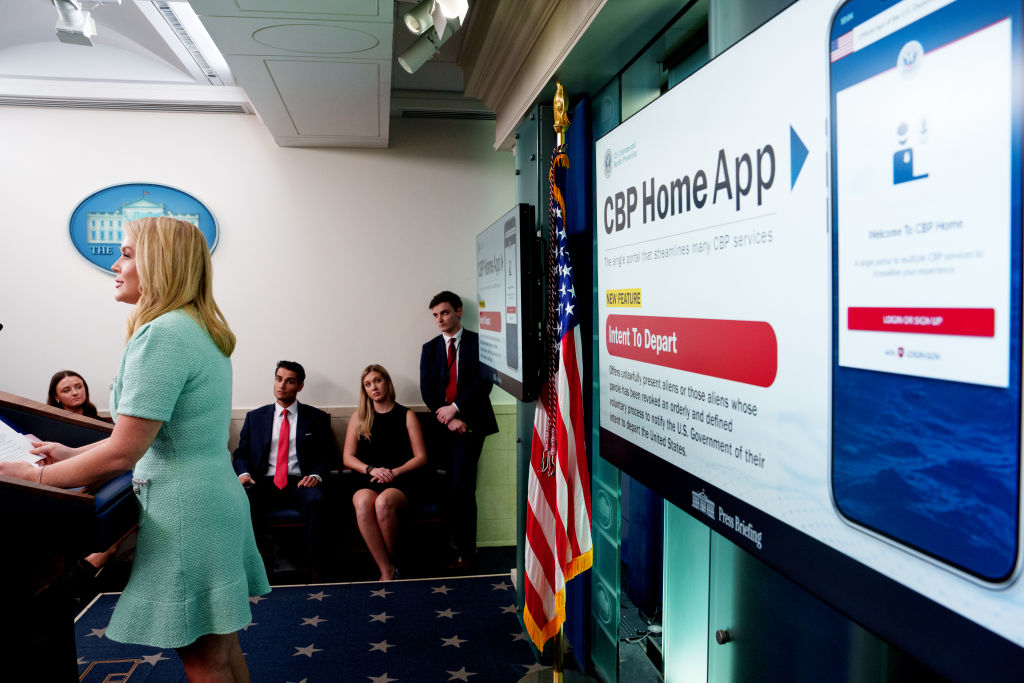
"Our plans look a little different..."
One of many frustrations that Jenni and Julie share is the amount of apathy towards immigrants that they witness among other Americans. “It isn’t just about deportation anymore,” Julie says. “It’s about detention and people disappearing and making money on detained bodies. I’m disappointed more people aren’t outraged.”
“They are destroying families,” Jenni adds. “I can’t understand what these people did that was so bad that you would want to rip the foundation of their life apart.”
Since Fidel left for Mexico, Jenni has been focusing on helping her oldest daughter with college applications. “I know if they want to come to me, they’ll come to me,” she tells me when I ask how they’re doing. “I don’t want to burden them.”
Meanwhile, Julie is continuing to support other mixed-status families through American Families United, an organization that advocates for legislation like the Dignity Act, which would allow undocumented immigrants to regularize their status provided they pass a criminal background check and pay any taxes that they owe. She’s also looking forward to the next time that she can visit Neftali in Mexico—and hopes to eventually move there.
“We talk every night,” she says. Sometimes, they reminisce about the past; mostly, they look forward to the future. While they once thought this would be in the United States, now they know that this will be in Mexico.
“Our plans look a little bit different than how we thought they would look,” Julie says. There are logistical issues. Neftali had been paying for his niece’s education, which is going to be more difficult when he’s earning in pesos instead of dollars. Julie is working on finding a way to pivot her business to something that she can do from Mexico.
“I don’t want any more time to be stolen from us,” she adds. “We’re going to work as hard as we can, so we can have a beautiful future like we always planned.”
“I feel a sense of freedom,” she says. “It’s just not in the United States.”

Anna Lekas Miller is a writer and journalist who covers stories of the ways that conflict and migration shape the lives of people around the world. She is the author of the book Love Across Borders and runs a newsletter by the same name. Follow her on Instagram: @annalekasmiller.
"It's very violent out there"
 October 21, 2025 Greetings, Meteor readers, If you’re reading this, you’ve survived the great AWS outage of 2025. We salute you.  In today’s newsletter, we learn what it’s like to be a journalist in an occupied American city. Plus, the home renovation seen ‘round the world. Shannon Melero  WHAT'S GOING ONTiffany Walden, like so many Americans, is mentally, physically, existentially, and utterly tired. She’s a Chicago-based journalist and editor-in-chief of The Triibe, a local outlet covering Chicago’s Black and Latine communities. Walden and her team have been working non-stop since late August, when President Trump first started threatening to send troops to Chicago. Although those troops didn’t manifest in the way Trump was threatening, Walden calls what is happening now—a heightened militarized presence in residential areas—an occupation. “I know journalism is and has been behind in naming a spade a spade,” she says, “But we need to call things what they are. There are masked agents in camouflage carrying [weapons] and deploying tear gas on residential blocks.” And for journalists whose job it is to be on those blocks, the experience is intense.“We are a city that will resist,” says Walden. “I personally feel called to act in this moment and to document this moment, specifically for our audience,” But even so, “our team is a little bit scared,” she says. One of her reporters was teargassed by a federal agent while reporting in a nearby neighborhood, she says, and “we’re seeing some of our peers be doxxed by this administration.” This is unfortunately becoming a common experience for journalists, as the U.S. creeps slowly towards authoritarianism and, as the International Women’s Media Foundation reports, journalists are facing increased violence. (Even before this administration, the IWMF found, more than a third of women journalists surveyed had been threatened with physical violence—or had experienced it.) There have been a number of instances where federal agents have injured journalists with impunity, something Walden has witnessed firsthand. “We have helmets, goggles, gas masks, bulletproof vests…you could have all the training, but things happen so fast in places you don’t expect them to happen. It’s easy to still be caught off guard.” It may be difficult for many of us to truly understand the threats journalists are under—especially amid reports of so many peaceful protests coming out of the recent No Kings weekend. Surely if hundreds of thousands of people can gather successfully with no incident, things can’t be all that bad? “No Kings is a vibe fest,” Walden explains. “Everyone is trying to have the cutest sign…life is too serious to do that right now.” But she does see some value. “I recognize that everybody is not in a position to put their body on the line in the same way that other people are,” she says referring to the higher levels of violence at protests outside of ICE facilities or in neighborhoods that are being raided. “I respect that [No Kings] is an option for people who are not prepared for that,” she says. “Because at other protests, like [what we saw] in Broadview, [federal agents] are out there tear-gassing anybody. It's very violent out there.” “I don’t know what the end of all this looks like,” Walden says, “But I’ll be very thrilled when we get to it.” AND:
 GOD'S GIFT TO THE ART OF BALLET (VIA GETTY IMAGES)
 FOLLOW THE METEOR Thank you for reading The Meteor! Got this from a friend?
|
![]()
An "Invasion" at Home
 October 7, 2025 Salutations, Meteor readers, Spooky season is fully upon us. The apples are cidered, and the pumpkins are spiced. Delicious.  In today’s newsletter, we take a look at Operation Midway Blitz in Chicago. Plus, a new doll for the sports fans.  WHAT'S GOING ONDespite objections and a lawsuit from the state of Illinois, Trump has deployed the National Guard to Chicago to augment ICE agents and detention facilities across the state. Governor JB Pritzker released a statement saying, “We must now start calling this what it is: Trump’s invasion.” Perhaps it seems like an overstatement to refer to the increased presence of federal agents and the National Guard as an invasion, but let’s look at the facts. Last month, the Department of Homeland Security initiated something called Operation Midway Blitz, which was designed to “target the criminal illegal aliens who flocked to Chicago and Illinois.” DHS claims this operation was driven by the death of a young Illinois resident, Katie Abraham, who was killed in a drunk driving incident in which the driver was an immigrant. So what’s come of it? Well, in the 30 days that Midway Blitz has been active, Block Club Chicago reports that ICE officers have shot two people, tear-gassed protestors, detained children and a journalist, choked a man, and shot a chemical agent into a reporter’s car—all under the guise of protecting U.S. citizens from immigrants. When pressed about children who had been detained and zip-tied, Russell Hott, the field director overseeing Midway Blitz, said, “Children have been encountered pursuant to arrests for targets. In those instances, there have been parents that wanted to bring their children with them, and we have accommodated that.” That so-called accommodation happened during an overnight raid at a South Shore apartment complex last week, where children were removed from their homes in the middle of the night, and 37 people were taken into custody. Chicagoans have been protesting Midway Blitz at every opportunity, which is why, according to Trump’s logic, the National Guard had to be brought in. But these moves aren’t just meant to instill fear into immigrants—they’re also meant to aggravate and worsen existing divisions in Black and Latine communities, which, despite having linked struggles in the United States, have often been at odds due to the racialization of different Latine groups, anti-Blackness, and political manipulation. When ICE agents pursued and choked a man in East Garfield Park last Wednesday, witnesses allegedly shouted at the officers, “He’s not Mexican, he’s Black,” in order to get them to stop harassing the man. These divisions are not a secret to the administration; they know we cannot fight them if we are busy fighting each other. But worsening immigration raids are not simply a “Latino issue” or a Mexican issue; they are a problem for everyone who doesn’t fit the ideal of what an American looks like—yes, that means anyone not white or white-presenting. Anti-immigration policy is, at its most basic level, rooted in racism, and that has never been clearer than it is now. The Trump administration does not want brown, Black, Asian, Chicano, or any other type of people living in the United States (Trump does want white South Africans, though), and Trump is using every tool available to him to make this country in his own crusty caucasian image. So once again, it is on We the People to do the work ourselves. We aren’t going to solve intraracial relations overnight, nor will we pretend they don’t exist. What we can do is recognize that our survival as people of various groups is inextricably linked.  AND:
 THE NEW DOLLS ARE MODELED AFTER ELLIE KILDUNNE, ILONA MAHER, NASSIRA KONDE, AND PORTIA WOODMAN-WCKLIFFE. (VIA MATTEL)
 FOLLOW THE METEOR Thank you for reading The Meteor! Got this from a friend?
|
![]()
The ICE Stories We Don't See on Camera
 September 25, 2025 Greetings Meteor readers, It’s been a very long week, but a delightful one in my life as one of my closest friends just had her first child (and no, I’m not talking about everyone’s bestie Rihanna).  BADGALRIRI BUT MAKE IT MINI (SCREENSHOT VIA INSTAGRAM) In today’s newsletter, we consider the lives lost in ICE custody. Plus, we commemorate the 30th anniversary of the historic United Nations Fourth World Conference on Women in Beijing. Baby C’s auntie, Shannon Melero  WHAT'S GOING ONYesterday, a young man opened fire across from an ICE detention facility in Dallas, Texas, killing one detainee and critically injuring two others before taking his own life, the AP reports. Little is known about the shooter and his motivations, but the Trump administration is already making early claims that this was an ideologically motivated killing based on writings allegedly tied to the shooter, and ammunition found at the scene that read “ANTI-ICE.” This is an ongoing investigation, and as details unfold, we will hopefully know and understand more. But something we know right at this moment is that, even prior to this shooting, 19 people have died in ICE custody this year. That’s 19 human beings—some possibly dead as a result of human rights violations while in federal custody. It is an ongoing tragedy, and perhaps what makes it even more tragic is that it is mostly going unnoticed. The actual taking of humans into ICE custody has stirred attention and outrage. Videos of immigrants and legal citizens across the country being snatched off the streets have gone viral; each time, we are angry, and we question why federal agents are wearing masks. But then what? For the most part, what happens to detained people next takes place with little media attention, except in a few cases that manage to hold the national attention, albeit briefly. But overall, ICE detainees are being disappeared and, now, 20 of them have disappeared permanently. Twenty lives may seem like a negligible number, especially with 58,000 individuals currently being held in detention centers around the country. But each one of them matters—to their families and to us. And when we go about our days as normal and no outcry accompanies these deaths, the administration gets the message that Americans are willing to tolerate at least this level of violence. What else might they do, counting on our silence? To find out what to do if you see ICE agents in your neighborhood, check out this comprehensive explainer from The Intercept. AND:

 “A revolution has begun. There is no going back.”On the anniversary of the Beijing women’s conference, a blueprint for a brighter future ONE OF THE OPENING DAY SESSIONS FOR BEIJING (VIA GETTY IMAGES) Thirty years ago this month, women from around the world gathered for a conference that made history and, as it turned out, would not happen again. The 1995 UN Fourth World Conference on Women in Beijing was a monumental moment for activists and world leaders who came together to “answer the call of billions of women who have lived, and of billions of women who will live,” as the first female Prime Minister of Norway, Gro Harlem Brundtland, put it at the time. It’s the meeting at which then-First Lady Hillary Rodham Clinton, building on years of women’s organizing, famously said, “Women’s rights are human rights,” which made global news because it was (and apparently remains) a radical perspective. The journey to the conference—which is documented in a new multimedia project from the United Nations Foundation and co-produced by The Meteor—was two decades long, with previous meetings held in Mexico City, Copenhagen, and Nairobi. Beijing itself was the largest women’s rights gathering at that point in history, with a massive audience of 45,000 people invested in building a better future. Pulling it off was no small task, but the leaders charged with doing so were more than up to it. Among them was the inimitable Gertrude Mongella of Tanzania, the Secretary-General of the conference, who later became known as Mama Beijing. “A revolution has begun,” she said during a closing speech at the Conference, “there is no going back.” Mongella was a key player in producing the Beijing conference’s most significant document: The Beijing Declaration and Platform for Action—which remains the most comprehensive blueprint for gender equality and women’s rights ever created. It wasn’t just a wish list; 189 countries committed to it in Beijing. It demanded women’s inclusion in government and policymaking; economic policies built with gender in mind; the understanding that violence against women is a human rights violation; and was also one of the first international agreements to demand that governments complete a thorough analysis of how climate change and industrialization had affected women. From the Platform: “The continuing environmental degradation that affects all human lives has often a more direct impact on women…Those most affected are rural and Indigenous women, whose livelihood and daily subsistence depends directly on sustainable ecosystems.” You probably know how this ends: While some of the Platform’s key goals have been achieved—women’s representation in government, for instance, has risen—many have yet to be fulfilled, 30 years later, not because of an absence of activism, but because of global backlash and competing priorities. But the women at the forefront of global change remain motivated. When asked what the next global feminist conference should focus on, Nyasha Musandu of the Alliance for Feminist Movements put it this way: “We must dare to dream bigger, disrupt deeper, and build bridges across movements. The fight for justice is not just about breaking barriers—it’s about reimagining the world itself.”  WEEKEND READING 📚🎧On the business of babies 🎧: Kindbody was poised to be a “disruptor” in the fertility industry. Was the human cost worth it? (IVF Disrupted) On your problematic friends: Emma Watson is still trying to grapple with her relationship to anti-trans author J.K. Rowling. (The Cut) On the shoulders of wives: There is one thing that makes it a little easier to drive a country toward fascism: a complicit housewife. (The Guardian)  FOLLOW THE METEOR Thank you for reading The Meteor! Got this from a friend?
|
![]()
SCOTUS Rules in Favor of Racial Profiling in Los Angeles
 September 10, 2025 Howdy, Meteor readers, Apparently, today is National Hot Flash Day. So sorry I didn’t get anyone a gift, but you know, the holidays sneak up on you!  In today’s newsletter, we pull back the curtain on the Supreme Court’s latest decision. Plus, good news for parents in New Mexico and a chat about Tylenol. Hot every day, Shannon Melero  WHAT'S GOING ONSomething old, something new: On Monday, the Supreme Court overturned a lower-court order that had temporarily blocked federal agents from stopping people in Los Angeles to ask them about their citizenship status based on race or ethnicity; whether someone speaks in Spanish or with an accent; and their location or profession, the New York Times reports. This means that, for the time being, anyone in LA who looks like they may be from another country can be stopped, questioned, and temporarily detained by a DHS officer without probable cause other than the color of their skin. All of this probably sounds vaguely familiar to you. Stop and frisk. Broken windows policing. Jim Crow. The Geary Act. All policies—from the 2000s, the ‘90s, and the late 1800s—that reflected this prejudiced thinking. In her dissent of the Court’s ruling, Justice Sonia Sotomayor, joined by Justices Elena Kagan and Ketanji Brown Jackson, writes, “The Constitution does not permit the creation of such a second-class citizenship status.” (It once did—but that’s why we have amendments, at least on paper.) However, in practice, the U.S. has had a long-standing relationship with racial profiling, discrimination, and the silent assertion of a second class—it is possibly the most American characteristic there is. But something about how it’s being deployed here feels a bit different. Perhaps it’s how quickly it all seems to be happening, or the violent, militarized nature of it; there is something new in this old practice.  DEMONSTRATORS GATHERED NEAR GRANT PARK IN CHICAGO TO PROTEST DONALD TRUMP'S IMMIGRATION POLICIES. (VIA GETTY IMAGES) “The Court’s order is troubling for another reason,” Sotomayor continues. “It is entirely unexplained.” The Supreme Court justices who issued the majority judgment gave no reasoning for why they overturned the original lower court order. (Meanwhile, Sotomayor’s dissent is 21 pages.) Perhaps that’s what feels novel: the blatant shamelessness with which discrimination is now enacted, despite all of our progress as a nation. There was a time when men convened in secret to plan and execute hateful acts. Now, extremists stroll through the White House in broad daylight, gleefully carrying out a supremacist agenda with the support of American voters. And not having to feel bad about it just fuels their now-unabashed ambition. So much so that the modern GOP is quite literally defending enslavement and trying to reshape how children learn America’s complete and despicable history. You know what they say, those who can’t remember the past… AND:
 FOLLOW THE METEOR Thank you for reading The Meteor! Got this from a friend?
|
![]()
Who Will Care for Your Children?
 July 17, 2025 Greetings, Meteor readers, Ya girl has had a particularly difficult week, but it’s all going to turn around because tomorrow I am getting sushi and pie with my bestie. That may not sound like a classic mix, but trust me, they go together like ramma-lamma-lamma-ka-dingity-da-dinga-dong. (Name that musical!) In today’s newsletter, we’re connecting the dots on childcare and immigration policy. Plus, remembering John Lewis, and your weekend reading list. Did you guess correctly, Shannon Melero  WHAT'S GOING ONIf ICE comes knocking, will you still have childcare?: In 2015, when our now-president was campaigning on the promise that he would remove “illegal aliens” from the United States, daytime talk show host Kelly Osbourne asked, “If you kick every Latino out of this country, then who is going to be cleaning your toilets, Donald Trump?” The rebuke was swift for Osbourne’s offensive wording, but there was a larger point buried under the casual racism. And in the era of Trump 2.0, with its brutal immigration policies, the question is: Who will be left to care for our children? The United States has a long history of outsourcing childcare, dating back to enslavement, and continuing through Reconstruction and into the 21st century. As Angela Garbes explained to The Meteor in 2022, the survival of American capitalism is dependent on “ignored” domestic labor. That labor is now largely being performed by immigrants, and if they’re removed from the country, “our care infrastructure will crumble,” warns the National Women’s Law Center (NWLC). Research shows that immigrants comprise up to 26 percent of not just the daycare but also the early-education workforce. In cities like New York and Los Angeles, nearly half of all female educators are immigrants. But with ICE raids expanding in immigrant communities, and the administration allowing agents to enter child-care centers for the first time since 2011, immigrant providers are under heavy threat. Their livelihoods, already tenuous, are being undermined in other ways, too: The administration is now barring undocumented immigrants from putting their children in Head Start programs—which have long served as a crucial support for the families of care workers—and recent changes to Medicare, SNAP, and child tax credits all make it harder for immigrant workers to make ends meet. And when child-care workers suffer, everyone suffers. Take the case of Nicolle Orozco Forero, a Colombian immigrant in Washington state who cared for children with disabilities. In June, after a routine monthly immigration meeting, she was detained by ICE and eventually deported. (Her young children, one of whom is gravely ill, were also deported.) The 19th’s Chabeli Carrazana spoke to the families who relied on Orozco Forero for care and writes that they “are now in a free fall…[Nicolle] was the connective tissue that kept families employed. Her loss has rippled across industries.” One mother was forced to quit her job after Orozco Forero was detained because she couldn’t find anyone else to care for her daughter, who has autism and is non-verbal. Meanwhile, the administration is patting itself on the back for being “pro-family.” After all, it increased both the child tax credit and the child care tax credit via the Big Beautiful Bill; what more could anyone want? A lot: As we’ve written, the BBB does more harm than good to the limited social safety net in America, especially for lower-income families. As Andrea Palus of Child Care for Every Family Network put it to USA Today, “I think the reconciliation bill did almost nothing for child care. And for sure, almost nothing related to the scale of the need.” There is almost nothing in this country that exists that wasn’t molded by immigrant hands, and that includes our children. And many Americans who assume that their citizenship will shield them from the fallout of anti-immigrant policies may be about to find out that the impact is as close to home as it gets. AND:
 LEWIS IN 1964 AT A PROTEST WHEN HE WAS NATIONAL CHAIRMAN OF THE STUDENT NON-VIOLENT COORDINATING COMMITTEE. (VIA GETTY IMAGES)
 A FAN TAKES IN THE VIEW WITH A SICK T-SHIRT DURING THIS MONTH'S PORTLAND FIRE LAUNCH EVENT IN OREGON. (VIA GETTY IMAGES)
 WEEKEND READING 📚On island life: Huda has spoken. (Call Her Daddy) On being eternally hot: Millennials are redefining what it looks like to enter midlife. Spoiler: we’re making midlife sexy again. (Elle) On centering victims: It’s been a long week of Epstein news, but Julie K. Brown, who broke many of the big Epstein stories, is keeping her focus on what matters: the women at the heart of the case. (Radio Atlantic; listen to the very end)  FOLLOW THE METEOR Thank you for reading The Meteor! Got this from a friend?
|
![]()
"Trying to Break Us Won't Work"
 June 10, 2025 Greetings, Meteor readers, It was a long weekend, especially for these two. Let’s jump right in. In today’s newsletter, The Meteor’s Angie Jaime writes to us from the West Coast to share what the last few days (and months) have been like in Los Angeles. Plus, the return of our better-news series, Tell Me Somethin’ Good. xoxo, Shannon Melero  WHAT'S GOING ONDispatch from Los Angeles: To hear national news tell it, the protests resisting immigration raids in L.A. are the product of ICE’s recent violent overreach, but the truth for those of us who live here is much more complex: The block has been hot, so to speak, for months. ICE has been roving the streets of Los Angeles actively since at least February, just weeks after historic wildfires had devastated the city, effectively kicking the community while we were already down. In my own Highland Park on the eastern side of town, ICE began appearing in my neighborhood about six weeks after the fires that forced us to evacuate; the agents began installing street blockades near schools and doing random door-to-door investigations, setting the community on edge. Then, last weekend, ICE activity roiled to a boil, when agents conducted raids at multiple Los Angeles-area locations Friday, arresting upwards of 200 people per day, sparking protests that drew thousands to the streets. But it isn’t the protests that are sending my city into disarray. My neighbors and I are distressed because of the terrorizing actions of ICE and local police, made worse by Trump’s decision to send in the National Guard and now the Marines over our own state’s objections. A cynical—and, let’s be real, accurate—assessment would be that this is occurring by design, that the military presence is an attempt by the Trump administration to break a wounded city into factions that would turn on its most vulnerable. But that’s clearly a strategy of someone with a grudge against California, who does not know or understand Los Angeles in all her complexity, massive and minuscule.  WHO DOESN'T LOVE A GOOD(VIA GETTY IMAGES) Trying to break us won’t work. In the face of both ICE and its unasked-for armed backup, community members have risen up to resist on behalf of those targeted. Protesters of all intersecting identities, young and old, of all genders and races, from across the county, have put their bodies on the line for their fellow citizens, for their families, for people they may never meet., Many community organizers who had previously mobilized around wildfire recovery, Palestinian free speech in the entertainment industry, and other urgent causes have quickly pivoted to protests against ICE—showing that in a time of need, Angelenos have one another’s backs. And by the way, L.A. is not a war zone. In Highland Park this weekend, the cookouts continued apace, the park where I took my six-month-old was teeming with laughing children, and the neighborhood shops were as filled as they are on any other Sunday. The fear, the horror, the agitation do not come from whatever actions protesters might take in expressing themselves. The fear looms because my neighbors may be snatched from their homes at any moment, because the government continues to escalate force against its own people in the pursuit of white supremacy, because regardless of status, being Brown means that nothing precludes you from having your family torn apart by ICE. And yet, Los Angeles is my home and will remain so, in no small part because of the people who make up its foundations. As a philosopher-poet once said, “It wouldn't be L.A. without Mexicans/It’s Black love, Brown pride in the sets again.” —Angie Jaime So how can you help? Volunteering with legal aid services, sharing resources, and financially supporting local aid funds all work (and, of course, urge your members of Congress to raise their voices—this is not normal). AND:
 TELL ME SOMETHIN' GOOD 🎶
 RM (L) AND V (R) WERE DISCHARGED FROM SERVICE THIS WEEK AND WERE MET BY A CROWD OF FANS IN CHUNCHEON, SOUTH KOREA. (VIA GETTY IMAGES)  FOLLOW THE METEOR Thank you for reading The Meteor! Got this from a friend?
|
![]()
A Plea for the "Disappeared" at the Statue of Liberty
 June 3, 2025 Greetings, Meteor readers, I want to extend the happiest of Happy Prides to all the organizers and participants of a historic sporting event that took place in Oslo on Sunday, the Ruck You Match. The event was a rugby game with a team of cis gender women scrapping against a team of trans women. It was organized as a big ruck you to a spate of bans on transgender women in sports. (If you’re curious, the final score was 34-7 with the cis women’s team coming out on top.) In today’s newsletter, we talk to filmmaker and activist Paola Mendoza about uplifting the stories of disappeared Venezuelans. Plus, a little good news for the girls and the gays, and a rundown of big upcoming Supreme Court decisions. 🏳️🌈♥️, Shannon Melero  WHAT'S GOING ONYearning to breathe free: Last Sunday, a group of strangers dressed in white sat, screamed, and held hands at the base of the Statue of Liberty. Before them stood filmmaker and activist Paola Mendoza, reading the names of the 238 Venezuelan men who have been “disappeared” by the Trump administration and sent to the El Salvadoran mega-prison Centro de Confinamiento del Terrorismo (CECOT). The demonstration, spearheaded by Mendoza, was a re-enactment of the now-infamous images of detained Venezuelan men being brought into CECOT, where they’ve been cut off from their families, along with any shred of due process.  (PHOTO BY KISHA BARI) When Mendoza conceived of the protest, she chose to center the men’s humanity—to remind everyone of the 238 human beings getting treated like political pawns. “I'm desperately trying to refuse to allow [these disappearances] to become normalized, to allow it to just be the banality of regular life,” she said. “How I do that is by uplifting stories, to say, ‘This is not normal … and we cannot allow it to become normal.’” One of the names Mendoza read was that of Ysqueibel Peñaloza, who was sent to CECOT in March despite having no criminal record in any country. Peñaloza was in the U.S. legally on a CBP One application, and was with friends shooting a music video when ICE agents raided the home and arrested him and several others. His mother, Ydalis Chirinos, has been vocal about her son’s plight. “Ysqueibel is one of the two greatest treasures that God gave me,” Chirinos tells The Meteor, and yet “I have no knowledge of how my son is being treated.” Chirinos, who is 50 years old and lives in Venezuela, says she waits up nearly all night hoping to hear from her son or his lawyers; the loss of sleep makes it hard to care for her daughter and ailing father. As she waits for the legal system to run its course, Chirinos appeals to the mercy of those in the United States: “What is happening has no explanation, at least for me, since we are human beings and children of God. We do not leave our country for pleasure, we do it out of necessity…I sincerely ask you to help me.”  THE FIRST GROUP OF MEN SENT TO CECOT IN MARCH. THEIR HEADS WERE SHAVEN UPON ARRIVAL AND THEIR HANDS AND FEET ARE CHAINED TOGETHER. (VIA GETTY IMAGES) Mendoza is hopeful that more Americans will hear pleas like Chirinos’. “[Prison abolitionist] Mariame Kaba says that hope is a discipline,” she said. “And this is when we have to be the most disciplined.” She posits that even though all sides generally agree that the immigration system is broken, the entire debate can be boiled down to a “yes” or “no” question: “Do you want to be a place that welcomes immigrants, or do you want to be a place that disappears them?” Increasingly, the U.S. looks like the latter; an anti-immigrant domino effect has been rolling out since the Obama administration, and with recent decisions from the Supreme Court, the Trump administration is poised to do even more damage. Nonetheless, “if we can figure out a way to get ourselves to the moon, figure out a way to create cell phones and process data and create AI centers,” Mendoza said, “then you got to fucking believe that we also could figure out a way to fix this immigration system. But there isn’t a [political] will or desire to do so and that is the problem, not immigrants.” Which is why the work of changing public opinion is so essential. Mendoza recounts the advice given to her by Morena Herrera, a former guerilla and reproductive rights activist in El Salvador: “She told me all regimes fall. How long a regime lasts is up to the people. AND:
 SOME OF THE MADLEEN'S CREW MEMBERS ON THE DAY THEIR VOYAGE BEGAN. (VIA GETTY AIMGES)
 CHEAT SHEET
What SCOTUS Is About to Do to Our Summer
BY CINDI LEIVE  PROTESTERS GATHERED OUTSIDE OF THE COURT EARLIER LAST MONTH TO SPEAK OUT AGAINST THE ADMINISTRATION'S THREATS TO BIRTHRIGHT CITIZENSHIP. (VIA GETTY IMAGES) Welcome to June, the month when the most legally-obsessed person in your friend group (hi, that’s us) starts compulsively refreshing the Supreme Court opinion site to be first to know what the Robed Ones have planned for our futures. These are the hot summer weeks that, in past years, have made us rejoice, rage, and panic—and 2025 will be a doozy: The justices are expected to rule on a raft of major cases with real-life, national impact before they break for the summer. A taste of what’s ahead:
Exhausted? Same. And that doesn’t even include big cases on pornography, Obamacare, or everything that joins the birthright case on the “emergency docket”—which is bulging lately given the steady stream of challenges to legally nonsensical White House orders. Stay tuned for more as the decisions roll out. And give thanks for the three queens of SCOTUS sanity, Sonia Sotomayor, Ketanji Brown Jackson, and Elena Kagan, who continue to stand for the law and our rights through all of it.  FOLLOW THE METEOR Thank you for reading The Meteor! Got this from a friend?
|
![]()
You Can Live Here, Until You Can't
 April 10, 2025 Greetings, Meteor readers, I never want to hear, read, or write about tariffs ever again. The whiplash is exhausting. In today’s newsletter, we connect the dots on the administration’s attacks against immigrants. Plus, the SAVE Act shows signs of life. He’s coming for our cheese, Shannon Melero  WHAT'S GOING ONWho gets to live here?: “I don’t understand why you’re so worried—you can’t be deported,” is a statement I’ve heard from several people since I started covering Trump’s mass deportation plans—plans which have seen more than 300 student visas revoked, about a dozen legal U.S. residents imprisoned, at least seven U.S. citizens detained (one apparently for legally representing a student protester), and one Maryland man deported. In the city where I live, ICE has carried out raids that have led to veterans being arrested without cause. And now, just two days ago, White House Press Secretary Karoline Leavitt confirmed that the Trump administration is looking into policies that would allow for the deportation of incarcerated U.S. citizens. This would be, of course, utterly illegal because of the Eighth Amendment; as one expert told Truthout, “There’s not even a hint of a possible way to do it under any circumstances whatsoever.”  MEMBERS OF THE HISPANIC CAUCUS HOLD UP IMAGES OF KILMAR ABREGO GARCIA, THE MARYLAND WHO WAS "MISTAKENLY" DEPORTED TO EL SALVADOR. (VIA GETTY IMAGES) But it was also illegal to deny due process, until it wasn’t. It was illegal to detain someone without a warrant and probable cause, until it wasn’t. There’s one thing you can say about the Trump administration: They’re resourceful. Whether by hook, crook, executive order, skirting the courts, or resurrecting wartime laws, this administration has proven it won’t be deterred by the legal process. Ostensibly, the judicial system should be able to protect the vulnerable—and some have been spared—but it simply isn’t happening fast enough for those currently sitting behind bars in Louisiana, Goshen, New York City, and El Salvador. In other words, this fear is not baseless. What I see in front of me is not a collection of disconnected arrests and deportations; I see the slow, carefully curated removal of people of color—especially outspoken ones—from the United States. People like my late father and my brothers who would meet Trump’s stated criteria for detention (criteria I will not specify because I’m not a snitch). People like my best friend, a woman well-known for speaking up for Palestinians on social media. People like my neighbors, many of whom are immigrants. What good is anyone’s perceived safety if the people who make living here worth it aren’t safe as well? The administration is making clear that it wants to paint protestors and people of color as an enemy—they’re literally deporting people under the Alien Enemies Act—but you’re the one who gets to decide who your enemies are and it’s not the protestor, or the Venezuelan dad, or the troubled teen. It’s probably just Deb, in accounting. AND:
 I AM SO GLAD MY HUSBAND IS NOT A LEBRON FAN BECAUSE I'M NOT SPENDING $75 ON THIS. LOOKS GREAT THOUGH. (VIA MATTELL)
 DOLORES HUERTA AND PRESIDENT OF THE AMAZON LABOR UNION CHRISTIAN SMALLS AT THE METEOR'S 22 FOR '22: VISIONS FOR A FEMINIST FUTURE. (VIA GETTY)  WEEKEND READING 📚On girls’ rights: School-aged girls across East Africa are being kicked out of school after forced pregnancy tests. (Teen Vogue) On being untethered: What would a woman’s life look like disconnected from the relationships that so often define it? Novelists are trying to imagine. (The Atlantic) On co-opting feminism: How the French far-right uses the language of women’s rights to demonize immigrants. (The Baffler)  FOLLOW THE METEOR Thank you for reading The Meteor! Got this from a friend?
|
![]()
Are Protests Now "Terrorism?"
 March 11, 2025 The weather is absolutely gorgeous in New Jersey, which means it is officially hiking season for me and my mini. We’re packin’ snacks, makin’ tracks, and yelling “dog” every time we see one. And speaking of sunny optimism, thanks to all of you who turned out for our International Women’s Day event at the Brooklyn Museum last Saturday! We loved seeing every one of you almost as much as Aurora James loved seeing Diane von Furstenberg.  ALL LOVE! (PHOTO BY REDENS DESROSIERS) In today’s newsletter, we look at the larger impact of a student arrest, plus a frightening report on who exactly is in our state legislatures. Plus, the second annual Meteor Madness bracket group is now open. From the trail, Shannon Melero  WHAT'S GOING ONA green card didn’t save him: On Saturday, Mahmoud Khalil, a former graduate student at Columbia University in New York and a vocal member of the pro-Palestinian movement on campus, was arrested by Department of Homeland Security officers in the lobby of his university-owned apartment building. According to Khalil’s attorney, who spoke to NPR, he was told by the arresting officers that he was being apprehended because his student visa had been canceled. When Khalil, who is Palestinian, told officers that he was a legal permanent resident with a green card, they said that his green card had been revoked, too. He was arrested without a warrant, and for several hours, his lawyers and his wife could not find him. He is now in a detention center in Louisiana—although attempts to deport him were temporarily blocked by a federal judge on Monday morning. A little context: Khalil’s arrest comes on the heels of an executive order issued by Donald Trump which promised to detain and deport “Hamas sympathizers on college campuses” and any non-citizen who “endorses or espouses terrorist activity.” (There is no evidence he has committed a “criminal offense,” The Atlantic reported. ) But Trump is still taking a twisted victory lap, posting on Truth Social: “This is the first arrest of many to come,” he wrote, calling protesters “paid agitators” and “terrorist sympathizers.” Khalil has not been charged with a crime, nor is there proof that he’s a “paid agitator.” There’s no evidence that he’s said anything threatening or violent. He was, however, a very visible protester of the genocide in Gaza. He’s a leader of Columbia University Apartheid Divest (CUAD), a coalition demanding the school’s divestment from Israel. A quick search of Khalil will turn up photos of him at protests, sit-ins, rallies, and encampments. But those activities—per the Constitution!—are not crimes. So let’s be clear: Mahmoud Khalil is a political prisoner, punished for exercising his First Amendment rights. A lot of us are rightly up in arms about Khalil’s arrest—an arrest that feels ironic because Mahmoud Khalil is what the state would normally consider a “model minority.” He has a master’s degree from a prestigious institution, he’s a husband and soon-to-be father, and he presented a green card at the time of his arrest. But none of that saved him—all because he expressed views the government disagreed with.  PROTESTORS GATHERING ON KHALIL'S BEHALF IN NEW YORK CITY. (VIA GETTY IMAGES) So as social-media users have been asking: If basic human rights are not extended to people like Khalil, who is protected? If you can disappear someone with a green card, who can’t you disappear? These are fair questions. It’s also worth a reminder that other vulnerable people’s rights were taken away recently with far less outcry. In January, the bipartisan Laken Riley Act rendered due process a thing of the past for undocumented immigrants; the bill is apparently a driving force in the increase in targeted ICE raids. Just last month, more than 100 Venezuelans —some of whom had no criminal charges against them—were also “disappeared” after being detained in Guantanamo Bay. What’s being done to Khalil is egregious, but it’s not isolated. Like many immigrants, Khalil sensed he could become a target and reached out for help, only for it to fall on deaf ears. When the president of the United States promised months ago that he was coming for everyone who was against him, we should have believed him—and not waited until he came for someone with a green card. AND:
 FOLLOW THE METEOR Thank you for reading The Meteor! Got this from a friend?
|
![]()

